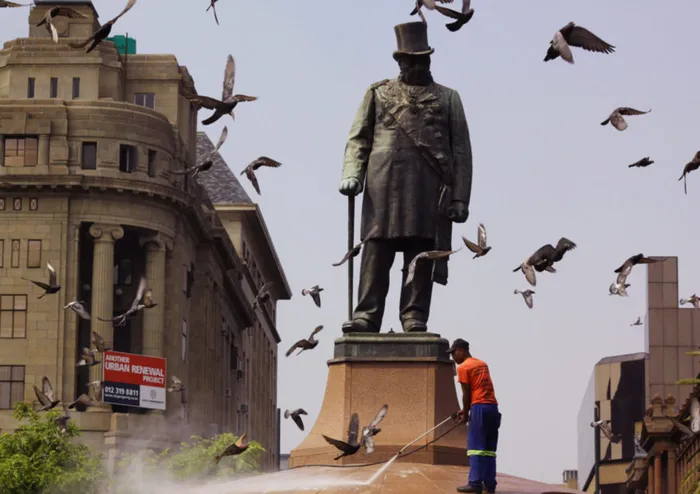Celebration of an Afrikaner icon belies Trump genocide claim

The Voortrekker Monument stands as a reminder of South Africa’s Afrikaner history.
Image: Thobile Mathonsi / Independent Newspapers Archives
On a warm spring day, more than 6 000 Afrikaners marked the 200th birthday of apartheid-nationalist icon Paul Kruger within sight of the Union Buildings in Pretoria, the seat of South Africa’s Black-majority government.
The authorities made no attempt to halt or interfere with the peaceful celebration where memorabilia commemorating Afrikaner rule was on open display, just one signal that belies claims the minority group is being persecuted.
Those include US President Donald Trump’s assertion that White Afrikaner farmers are being subjected to genocide, a falsehood that’s sparked outrage among South Africans and soured relations between the two nations.
Afrikaans speakers - not all of whom are White - account for about 11% of the population of 63 million, hold top positions in business, academia and the judiciary, and rank among the country’s wealthiest individuals. Afrikaans- and English-speaking White families on average earn almost five times as much as their Black counterparts, government data shows.
“Afrikaners are doing very well in South Africa,” said JP Landman, an Afrikaans political analyst and author. “Are they being persecuted? No. Is there a campaign against them? No. Are Trump’s allegations about the Afrikaners true? No.”
The September 24 gathering was staged at the Voortrekker Monument, a granite edifice that was opened a year after apartheid was officially instituted in 1948 to celebrate a 19th-century Afrikaner expedition to escape British rule. Couples dressed in traditional bonnets and waistcoats danced to folk music, while children joined treasure hunts and went on camel rides.
The crowd looked on as a flat-bed truck bearing a four-meter-tall (14-foot-tall) bronze statue of Kruger, who led one of South Africa’s early Afrikaner republics, departed on a week-long trip through nine towns. It culminated in Orania, a controversial separatist town that was founded in 1991 and encourages settlement by White, Christian Afrikaners.
Afrikaners instituted apartheid rule and dominated politics for almost half a century before it ended in 1994 and Nelson Mandela and his African National Congress took power in the first multiracial elections. The party now leads a coalition government that includes the Afrikaner nationalist Freedom Front Plus, which set up a branded gazebo at the Pretoria event.
Crime directed against White farmers, language policies and affirmative-action laws meant to redress the inequities of White rule have bred resentment in some corners of the Afrikaner community and sparked claims it’s under siege. Trump’s allegation that the group is being targeted - and his decision to offer them refugee status, even as his administration rejects asylum seekers from almost everywhere else - has given international voice to such concerns.
Many towns and roads bearing Afrikaans names have been renamed since 1994, but statues of Afrikaner leaders are still displayed in public. Groups such as the radical Economic Freedom Fighters party have repeatedly called for symbols of the country’s racist history to be removed.
Kallie Kriel, the leader of fringe Afrikaner rights group Afriforum, accused the government of failing to support the preservation of his community’s culture, while prioritising that of others. Afriforum played a key role in persuading Trump that White farmers are being victimised, although it hasn’t echoed his genocide claims.
“While there’s a threat, we will simply continue to protect our own heritage,” Kriel said against the backdrop of the Voortrekker Monument draped in the colours of Kruger’s republic.
The monument, which gets no government funding, embodies Afrikaners’ ethnic pride - although many South Africans see it as a symbol of a painful past.
A handful of those who attended the event on the Heritage Day public holiday, which celebrates all South African culture, were intent on commemorating the era when Afrikaners still held power.
A young couple waved the banned apartheid-era flag, an act the event organisers said wouldn’t be permitted. One woman wore the flag’s colours in her hair braids, as did a team of cart horses in their feather plumes.
Few attendees showed any appetite to take up an offer of refugee status in America. There’s been little news of the first 59 successful applicants, who departed on a US-chartered flight to Virginia in May.
Trump is considering capping new refugee admissions at a record low of 7,500, down from a current limit of 125,000, with White South Africans expected to be favoured over immigrants fleeing war or famine, according to people familiar with the matter.
“We must stay right here,” said Francois Potgieter, 73, an upholstery business owner from the town of Middelburg even as he bemoaned the state of the country. “If the Lord wanted me to be American, he would’ve put me there.”
Despite the nature of the Heritage Day gathering, a handful of Black people attended. They included Rufus Ramonetha, 46, an attorney from Pretoria and his 8-year-old daughter, who said they took advantage of the discount entry fee of about $1 - a tenth of the normal price - to visit the monument and see how their compatriots from different backgrounds lived.
“Everybody minds his own business,” he said. “As long as it’s open for everybody, then why not.”
Aike Obodo, a Liberian who wore his own traditional dress to the event, which he attended with his South African wife and two children, heralded it as a celebration of culture. “We are all one people,” he said. “Africans must unite.”
Geani Pieterse, an engineer from Pretoria, is among those Afrikaners that remain optimistic there is a place for them in South Africa and sees a future for her two young children in the country.
“It might not look the same as our childhood did,” she said as she posed for a picture in front of Kruger’s statue with her husband, Juan. “But I actually think they will know a better South Africa than we do.”